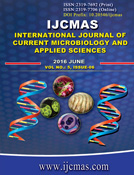


 National Academy of Agricultural Sciences (NAAS)
National Academy of Agricultural Sciences (NAAS)

|
PRINT ISSN : 2319-7692
Online ISSN : 2319-7706 Issues : 12 per year Publisher : Excellent Publishers Email : editorijcmas@gmail.com / submit@ijcmas.com Editor-in-chief: Dr.M.Prakash Index Copernicus ICV 2018: 95.39 NAAS RATING 2020: 5.38 |
Plastics and their use has become a part in all sectors of economy. The word plastic comes from the Greek word ‘plastikos’, which means, able to be molded into different shapes. This study has covered the major concerns about the natural and synthetic polymers, their types, uses and degradability. The present study deals with the isolation, identification and degradative ability of plastic degrading microorganisms from soil. Different types of changes are produced by the microorganism during morphological and biochemical analysis. Synthetic plastic sample collected from the dumped soil of garden was used in this study. The morphology of the isolates was observed and genus was identified by biochemical tests as Bacillus sp. and Aspergillus sp. In the study, pieces of plastics and synthesized PES membrane were inoculated in the liquid culture medium and kept for 1 month to observe the percentage of weight loss by bacteria and fungi. The percentage of weight loss due to degradation was found more by Bacillus. This shows greater potential of degradation compared to Aspergillus. The preliminary screening of biodegradation capability was done by Fourier Transform Infra-Red (FTIR) Spectroscopy and SEM (Scanning electron microscopy) analysis. Target DNA from isolated strain was submitted for 16S rRNA sequencing after which BLAST and phylogenetic analysis have to be carried out.
Bhuvaneswari, S., G. Subashini1 and Sarojini, R. 2016. Comparative Study of Plastic and Polymer Degrading Bacillus megaterium and Aspergillus niger isolated from dumped plastic waste.
Int.J.Curr.Microbiol.App.Sci. 5(6): 22-31. doi: http://dx.doi.org/10.20546/ijcmas.2016.506.003 |
 |
 |
 |
 |